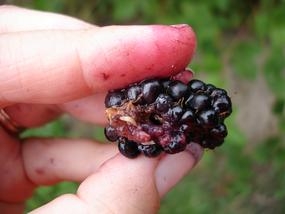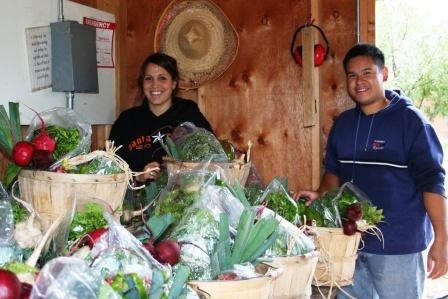Posts Tagged: sustainability
Reinventing agriculture at Russell Ranch
The size, scope and intensity of research at Russell Ranch Sustainable Agriculture Facility at UC Davis make the 300-acre experiment like no other in the world. The ranch’s unique focus on sustainability research is what draws producers, researchers and students to its annual Russell Ranch Sustainable Agriculture Field Day.
Located just west of the main UC Davis campus, Russell Ranch is a testing ground for the long-term sustainability of various farming methods. Research at the ranch focuses on fundamental components of agricultural production – energy, water and land resources – to help address the big questions of the future.
“The human population on the planet is going to increase from about 7 billion people to 9 billion people in 2050, which raises questions about food supply,” said Tom Tomich, director of the Agricultural Sustainability Institute at UC Davis, which houses Russell Ranch. “There is a great success story with agriculture and food production in the last 40 or 50 years – roughly doubling food supply. What that took, though, was doubling of nitrogen, tripling of phosphorus, a lot of advanced research. Now, are we going to be able to do this next doubling to feed the next two billion with business as usual? Or are we are going to have to discover new ways of combining sustainability with intensification to increase productivity?”
A majority of the ranch is comprised of a century-long research project devoted to better understanding the relationships between inputs like fertilizers and cover crops, and various indicators of sustainability. The rest of the ranch hosts a variety of other experiments conducted by researchers not involved in The Century Experiment.
Russell Ranch Field Day
Just as spring gives way to the heat of summer every year Russell Ranch hosts a field day to highlight the research in sustainable farming that is being conducted at UC Davis and primarily at the ranch. This year’s field day focused on issues involving nitrogen, water and climate change.
More than 160 growers, scientists and students learned about greenhouse gas emissions from agriculture, California’s new carbon market and soil microbial communities. Researchers from UC Davis and the company PureSense presented the results of research on a novel method for determining local, crop-specific water demand levels in real time to improve irrigation scheduling.
Thomas Harter, UC Cooperative Extension specialist in the UC Davis Department of Land, Air, and Water Resources, shared the results of a new report, “Addressing Nitrate in California’s Drinking Water,” which is the first comprehensive scientific investigation of nitrate contamination in two of the most agriculturally rich areas of California – the Tulare Lake Basin and the Salinas Valley. Harter and his team found that more than 90 percent of human-generated nitrate contamination of groundwater in these basins is from agricultural activity.
“First and foremost, this is about getting safe drinking water to people,” Harter said.
Problems like these inspire researchers at Russell Ranch to help agriculture develop in a way that will feed the planet’s growing population without creating health and environmental problems, Tomich said.
“California agriculture has always had this spirit of innovation. It has basically reinvented itself every generation. So, a lot of what we’re about here and throughout the Agricultural Sustainability Institute at UC Davis is asking: What’s going to be the scientific foundation for the next generation of California agriculture?”

Field day at Russell Ranch.
Pests present border threat
"Whether they know it or not, every person in the country is affected by this, whether by the quality or cost of their food, the pesticide residue on food or not being able to enjoy the outdoors because beetles are killing off the trees," said Mark Hoddle, an entomologist specializing in invasive species at the University of California, Riverside.
Springs rains blamed for sudden oak death increase
Guy Kovner, The (Santa Rosa) Press Democrat
The level of sudden oak death infection in Sonoma County and other parts of the Bay Area tripled over last year's rate, according to a survey conducted in June in nine counties from Humboldt to Monterey.
“It's a red flag,” said Matteo Garbelotto, head of UC Berkeley's forest pathology laboratory.
What sustainability means in agriculture
Amanda Radke, Tri-State Livestock News
Amada Radke reported on a panel discussion on agricultural sustainability, which took place at UC Davis in September. The panel included farmers, activists and the dean of the UC Davis College of Agriculture and Environmental Sciences Neal Van Alfen.
“There is so much debate and controversy among naturally-raised foods and conventionally-raised foods, and that's too bad, because one isn't always better than the other,” said Van Alfen. “If we don't make our system work, we are all in trouble. We have to figure out how to feed the world sustainably. Research is so important to help farmers reduce input costs and work to make organic foods more sustainable and efficient.”
New college degree: “Sustainable agriculture and food systems”
The University of California, Davis, is launching a new undergraduate major — “Sustainable Agriculture and Food Systems.” The program integrates several subjects to give students an understanding of the many issues facing contemporary farming and food systems, including production, processing, distribution, consumption, and waste management.
As noted in the Los Angeles Times, “With rising public interest in where our food comes from — as well as in "green" living — it makes sense that higher education would be eager to attract students who want to tap into the intersection between these two fields.”
Students will focus on the social, economic, and environmental aspects of agriculture and food — from farm to table and beyond. The program is designed to help students obtain a diversity of knowledge and skills, both in the classroom and through personal experiences on and off campus.
Students will take courses in a broad range of disciplines, but will focus in one of three tracks: Agriculture and Ecology, Food and Society, or Economics and Policy.
“This interdisciplinary curriculum will prepare students to become leaders in agriculture and food systems,” said professor Thomas Tomich, the major adviser for the program and director of the Agricultural Sustainability Institute at UC Davis.
The major is new, but UC Davis has been covering the subject in field- and classroom-based interdisciplinary learning opportunities at the Student Farm at UC Davis for more than 35 years, said Mark Van Horn, the Student Farm director who will teach a core course in the major.
“Learning through doing and reflection adds a valuable dimension to students’ education because it helps them see the connections between theory and practice in the real world,” Van Horn said.
“This is an exciting addition to the college that reflects a change in how we think about food and agriculture,” said Neal Van Alfen, dean of the College of Agricultural and Environmental Sciences. “Students will gain a broad perspective of what it takes to put dinner on the table in an era of greater demand and fewer resources.”
For more information:
- Full press release
- UC Davis Student Farm
- UC Davis Agricultural Sustainability Institute
- About the major
Boost sustainability by eating low on the food chain
Some people believe eating low on the food chain is one way to help preserve the environment. And, in fact, livestock production consumes much more land and other resources per calorie than the production of plant foods.
A story on the website Bohemiam.com suggests it also makes sense to eat insects for improved dietary sustainability. Insects and other arthropods constitute an edible resource of tremendous biomass, the article said. Ants alone reportedly make up about a third of all terrestrial animal biomass.
Iowa State University's entomology department provides recipes for "rootworm beetle dip," which includes a cup of dried and roasted beetles. The site also has recipes for "banana worm bread," chocolate chip cookies with dried crickets crumbled into the dough and "mealworm fried rice," calling for equal parts rice and larvae.
Writer Alistar Bland got information for his story about the consumption of snails from a UC Davis website. Mainly known as a garden pest, snails were introduced into California from France in the 1850s as a food source. Snails may be sautéed in butter and garlic and served in the shell.
An eight-page UC publication is available for $1.50 from the UC Agriculture and Natural Resources catalog with instructions for raising and preparing snails for food.

Common garden snails can be a sustainable food source.
Beef business writer blasts new food movement
A commentary that appeared on the Web site Drovers.com, an information source for beef industry insiders, said the dialog at the Farm, Food & Health Conference held March 2 and 3 in Kansas City was "unbalanced and unrealistic."
"Much of the conversation at the . . . conference," Drovers editor Greg Henderson wrote, "centered around the idea that a 'movement' is taking shape in America to change our food system."
In the article, Henderson quoted conference speaker Larry Yee, director emeritus of UC Cooperative Extension in Ventura County and co-founder of the Association of Family Farms.
"Our current system is fundamentally unsustainable," Yee told attendees. "I believe the antidote is a 21st Century recreation of the food system."
Yee said there are deep flaws in the global economic paradigm and criticized modern industrial agriculture as a system that has been developed only to seek efficiency and profits. He said the current system is designed to produce cheap and abundant food and calories.
These examples were presented by Henderson as evidence of the "tone" of the conference, which he said inferred that local, natural and organic foods are "good," and that food produced with the assistance of modern technology - such as antibiotics, hormones, fertilizers and pesticides - are "bad."
"The first Farm, Food & Health Conference produced an unflattering and unbalanced view of American agriculture - and provided unrealistic expectations for a 21st Century food system," Henderson wrote.



